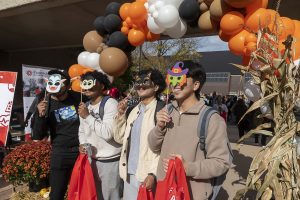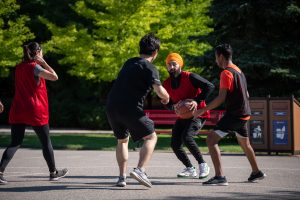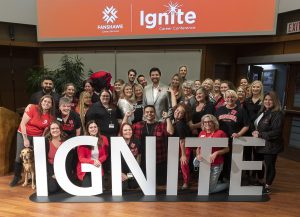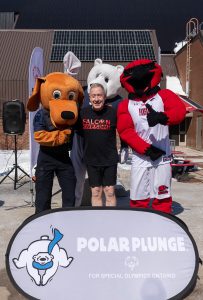16.8 Connecting and Communicating in Action
Strong social connections, including feeling like you belong at Fanshawe, influence your academic success.
Like with many things, it is important to consider your purpose of any communication. These could include:
- To inform
- To persuade
- To educate
- To entertain
- To improve relationships
Recognize the Value of Social Interaction

Humans are social creatures—it’s simply in our nature. We continually interact with other students and professors, and we can learn a great deal from these interactions that heighten the learning process. This frequent interaction with others forms a state of interdependence. College students depend on their professors, but just as importantly, they depend on other students in many ways.
Building good relationships is important for happiness and a successful college experience. College offers the opportunity to meet many people you would likely not meet otherwise in life and allows you to further develop your social intelligence.
Making New Friends

Some people just make friends naturally, but many first-year college students are more shy or quiet and may need to actively seek new friends. Here are some starting points:
- Try to sit with different people in classrooms and actively seek out people you don’t know for group work.
- Actively participate in online discussion boards to let people get to know more about who you are and what you think.
- Ask others about themselves. Show others that you’re interested in what they think by asking questions to further the conversation, whether online or in person.
- Study in a common area or lounge where you’ll be among others or go to open office hours with your professor to meet your classmates.
- Be open in your interests. Don’t limit yourself to people who share only certain interests. Meeting people by studying together is an excellent way to get to know people with different interests.
The college social experience also includes organized campus groups and activities. Participating in organized activities requires taking some initiative—you can’t be passive and expect these opportunities to come knocking on your door—but is well worthwhile for fully enriching college interactions.
The active pursuit of a stimulating life on campus offers many benefits.
Organized groups and activities:
- Speed your transition into your new life. Rather than waiting for it to come along on its own, you can immediately begin broadening your social contacts and experiences by joining groups that share your interests.
- Help you experience a much greater variety of social life than you might otherwise. New students often tend to interact more with other students their own age and with similar backgrounds—this is just natural. But if you simply go with the flow and don’t actively reach out, you are much less likely to meet and interact with others from the broader campus diversity.
- Help you gain new skills, whether technical, physical, intellectual, or social. Such skills may find

© Fanshawe College their way into your résumé when you next seek a job or your application for a scholarship or other future educational opportunity. Employers and others like to see well-rounded students with a range of proficiencies and experiences.
- Are fun and a great way to stay healthy and relieve stress. Exercise and physical activity are essential for health and well-being, and many organized activities offer a good way to keep moving.
How to Get Involved

College campuses offer a wide range of clubs, organizations, and other activities open to all students. College administrators view this as a significant benefit and work to promote student involvement in such groups. It’s a good time now to check out the possibilities:
- Browse the Fanshawe Student Union Web site, where you’re likely to find links to pages for student clubs, events and organizations.
- Watch for club fairs, open houses, and similar activities on campus. Talk with the representatives from any group in which you may be interested.
- Look for notices on bulletin boards around campus. Student groups really do want new students to join, so

© Fanshawe College they usually try to post information where you can find it.
- Consider other forms of involvement and roles beyond clubs. Gain leadership experience by running for office in student government or applying for a residence hall support position.
- If your campus doesn’t have a group focused on a particular activity you enjoy yourself, think about starting a new club.
Take chances and explore. Attending a meeting or gathering is not a commitment—you’re just going the first time to see what it’s like, and you have no obligation to join. Keep an open mind as you meet and observe other students in the group, especially if you don’t feel at first like you fit in: remember that part of the benefit of the experience is to meet others who are not necessarily just like everyone you already know.
Balancing Schoolwork and Social Life
If there’s one thing true of virtually all college students, it’s that you don’t have enough time to do everything you want. Once you’ve developed friendships within the college community and have an active social life, you may feel you don’t have enough time for your studies and other activities such as work.
For many students, the numerous social opportunities of college become a distraction, and with less attention to one’s studies, academic performance can drop. Use the tips from the chapter on Time Management to help ensure you schedule your social time as well.
“6.7 Connecting and Communicating in Action” from Fanshawe SOAR by Kristen Cavanagh is licensed under a Creative Commons Attribution-NonCommercial-ShareAlike 4.0 International License, except where otherwise noted.

